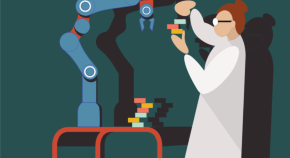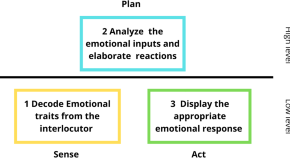Collection
Experimental and Integrative Approaches to Robo-Ethics
- Submission status
- Closed
Editors
-
Francesco Bianchini
Associate professor at the Department of Philosophy and Communication Studies of the University of Bologna (Italy). He obtained a PhD in Philosophy at the University of Bologna while visiting at the Center of Research on Concepts and Cognition of Indiana University. He is a researcher in philosophy of science, artificial intelligence, and cognitive science. He works on disciplines such as artificial intelligence, robotics, and synthetic biology, and their connections, and he is also interested in some forms of inductive and analogical reasoning. He is the author of several international publications in journals and books.
-
Luisa Damiano
Associate professor of Philosophy ofd Science at the IULM University of Milan (Italy), where she coordinates the Research Group on Epistemology of the Sciences of the Artificial (RG-ESA). Her main research fields are: Epistemology of the Sciences of Complex Systems; Epistemology of the Cognitive Sciences and Philosophy of Mind, Epistemology of the Sciences of the Artificial, with a focus on the Synthetic Modeling of Life and Cognition, in particular in Synthetic Biology and in Cognitive, Developmental and Social Robotics. On the topics of her research she published many articles, co-edited a number of special issues.
-
Edoardo Datteri
Associate professor at the Department of Human Science for Education, University of Milano-Bicocca, where he teaches Philosophy of Science and Educational Robotics. He is founder and coordinator of the RobotiCSS Lab (Laboratory of Robotics for the Cognitive and Social Sciences) of the same University. He obtained his PhD in philosophy at the University of Pisa and, from 2001 to 2005, was research collaborator at the Advanced Robotics Technology and Systems Laboratory of the Scuola Superiore Sant’Anna, Pisa.
-
Pierluigi Graziani
Master Degree in Philosophy at the University of Urbino (Italy) in 2001, and his PhD in Logic and Epistemology at the University of Rome La Sapienza in 2007. In 2010 he held a three years' Postdoctoral position in the History of Mathematics, Logic and Philosophy of Science at the University of Urbino; and from July 2014 to August 2017 he worked as a Postdoctoral Fellow in Logic and Philosophy of Science at the University of Chieti-Pescara. From December 2018 he has been working as a Postdoctoral Fellow in Logic and Philosophy of Science at the University of Urbino.
Articles (12 in this collection)
-
-
Responsible Social Robotics and the Dilemma of Control
Authors
- Marianna Capasso
- Content type: OriginalPaper
- Open Access
- Published: 13 October 2023
- Pages: 1981 - 1991
-
A Taxonomy of Factors Influencing Perceived Safety in Human–Robot Interaction
Authors (first, second and last of 4)
- Neziha Akalin
- Andrey Kiselev
- Amy Loutfi
- Content type: OriginalPaper
- Open Access
- Published: 09 July 2023
- Pages: 1993 - 2004

-
Ethics and Robot Democratization: Reflecting on Integrative Ethics Practices
Authors
- Jesse de Pagter
- Content type: OriginalPaper
- Open Access
- Published: 22 May 2023
- Pages: 2005 - 2018

-
Correction to: Integrative Robo-Ethics: Uncovering Roboticists’ Attitudes to Ethics and Moving Forward
Authors (first, second and last of 4)
- Antonio Fleres
- Louise Veling
- Luisa Damiano
- Content type: Correction
- Published: 17 April 2023
- Pages: 1703 - 1703
-
Integrative Robo-Ethics: Uncovering Roboticists’ Attitudes to Ethics and Moving Forward
Authors (first, second and last of 4)
- Antonio Fleres
- Louise Veling
- Luisa Damiano
- Content type: OriginalPaper
- Published: 08 March 2023
- Pages: 2019 - 2037

-
Artificial Emotions: Toward a Human-Centric Ethics
Authors
- Laura Corti
- Nicola Di Stefano
- Marta Bertolaso
- Content type: OriginalPaper
- Published: 11 June 2022
- Pages: 2039 - 2053

-
Ethical Considerations from Child-Robot Interactions in Under-Resourced Communities
Authors (first, second and last of 5)
- Divyanshu Kumar Singh
- Manohar Kumar
- Jainendra Shukla
- Content type: OriginalPaper
- Published: 26 May 2022
- Pages: 2055 - 2071

-
Social Robotics and Synthetic Ethics: A Methodological Proposal for Research
Authors
- Bako Rajaonah
- Enrico Zio
- Content type: OriginalPaper
- Published: 08 April 2022
- Pages: 2075 - 2085
-
Ethics & Robotics, Embodiment and Vulnerability
Authors
- Paul Dumouchel
- Content type: OriginalPaper
- Published: 09 March 2022
- Pages: 2087 - 2099
-
The Psychological Implications of Companion Robots: A Theoretical Framework and an Experimental Setup
Authors
- Nicoletta Massa
- Piercosma Bisconti
- Daniele Nardi
- Content type: OriginalPaper
- Open Access
- Published: 28 January 2022
- Pages: 2101 - 2114
-
A Storytelling Robot Managing Persuasive and Ethical Stances via ACT-R: An Exploratory Study
Authors (first, second and last of 4)
- Agnese Augello
- Giuseppe Città
- Antonio Lieto
- Content type: OriginalPaper
- Open Access
- Published: 22 December 2021
- Pages: 2115 - 2131



